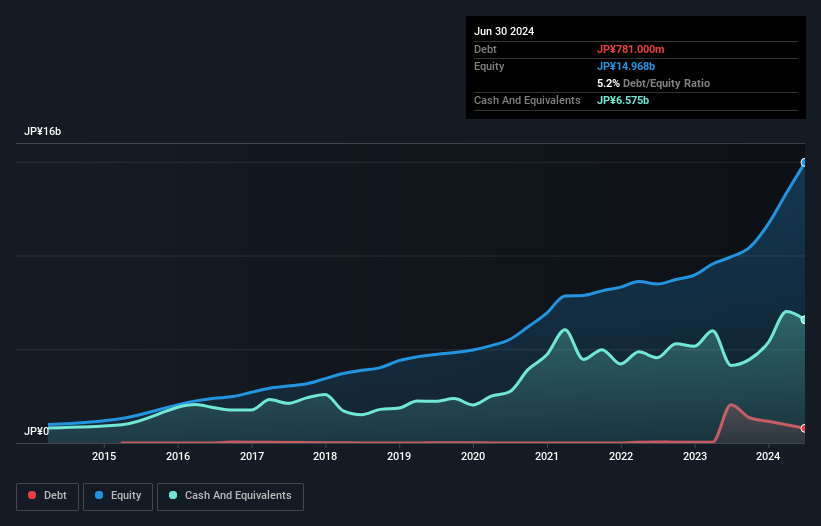Legendary fund manager Li Lu (who Charlie Munger backed) once said, 'The biggest investment risk is not the volatility of prices, but whether you will suffer a permanent loss of capital.' So it seems the smart money knows that debt - which is usually involved in bankruptcies - is a very important factor, when you assess how risky a company is. We can see that Rakus Co., Ltd. (TSE:3923) does use debt in its business. But the more important question is: how much risk is that debt creating?
When Is Debt Dangerous?
Generally speaking, debt only becomes a real problem when a company can't easily pay it off, either by raising capital or with its own cash flow. In the worst case scenario, a company can go bankrupt if it cannot pay its creditors. However, a more common (but still painful) scenario is that it has to raise new equity capital at a low price, thus permanently diluting shareholders. By replacing dilution, though, debt can be an extremely good tool for businesses that need capital to invest in growth at high rates of return. The first step when considering a company's debt levels is to consider its cash and debt together.
View our latest analysis for Rakus
What Is Rakus's Debt?
The image below, which you can click on for greater detail, shows that Rakus had debt of JP¥781.0m at the end of June 2024, a reduction from JP¥2.04b over a year. However, its balance sheet shows it holds JP¥6.58b in cash, so it actually has JP¥5.79b net cash.

How Strong Is Rakus' Balance Sheet?
According to the last reported balance sheet, Rakus had liabilities of JP¥6.37b due within 12 months, and liabilities of JP¥216.0m due beyond 12 months. Offsetting this, it had JP¥6.58b in cash and JP¥5.98b in receivables that were due within 12 months. So it can boast JP¥5.97b more liquid assets than total liabilities.
This state of affairs indicates that Rakus' balance sheet looks quite solid, as its total liabilities are just about equal to its liquid assets. So while it's hard to imagine that the JP¥364.7b company is struggling for cash, we still think it's worth monitoring its balance sheet. Simply put, the fact that Rakus has more cash than debt is arguably a good indication that it can manage its debt safely.
Even more impressive was the fact that Rakus grew its EBIT by 186% over twelve months. If maintained that growth will make the debt even more manageable in the years ahead. The balance sheet is clearly the area to focus on when you are analysing debt. But it is future earnings, more than anything, that will determine Rakus's ability to maintain a healthy balance sheet going forward. So if you're focused on the future you can check out this free report showing analyst profit forecasts.
Finally, while the tax-man may adore accounting profits, lenders only accept cold hard cash. While Rakus has net cash on its balance sheet, it's still worth taking a look at its ability to convert earnings before interest and tax (EBIT) to free cash flow, to help us understand how quickly it is building (or eroding) that cash balance. During the last three years, Rakus produced sturdy free cash flow equating to 59% of its EBIT, about what we'd expect. This cold hard cash means it can reduce its debt when it wants to.
Summing Up
While it is always sensible to investigate a company's debt, in this case Rakus has JP¥5.79b in net cash and a decent-looking balance sheet. And we liked the look of last year's 186% year-on-year EBIT growth. So is Rakus's debt a risk? It doesn't seem so to us. Over time, share prices tend to follow earnings per share, so if you're interested in Rakus, you may well want to click here to check an interactive graph of its earnings per share history.
When all is said and done, sometimes its easier to focus on companies that don't even need debt. Readers can access a list of growth stocks with zero net debt 100% free, right now.
New: AI Stock Screener & Alerts
Our new AI Stock Screener scans the market every day to uncover opportunities.
• Dividend Powerhouses (3%+ Yield)
• Undervalued Small Caps with Insider Buying
• High growth Tech and AI Companies
Or build your own from over 50 metrics.
Have feedback on this article? Concerned about the content? Get in touch with us directly. Alternatively, email editorial-team (at) simplywallst.com.
This article by Simply Wall St is general in nature. We provide commentary based on historical data and analyst forecasts only using an unbiased methodology and our articles are not intended to be financial advice. It does not constitute a recommendation to buy or sell any stock, and does not take account of your objectives, or your financial situation. We aim to bring you long-term focused analysis driven by fundamental data. Note that our analysis may not factor in the latest price-sensitive company announcements or qualitative material. Simply Wall St has no position in any stocks mentioned.
About TSE:3923
Outstanding track record with flawless balance sheet.
Market Insights
Weekly Picks

THE KINGDOM OF BROWN GOODS: WHY MGPI IS BEING CRUSHED BY INVENTORY & PRIMED FOR RESURRECTION


Why Vertical Aerospace (NYSE: EVTL) is Worth Possibly Over 13x its Current Price


The Quiet Giant That Became AI’s Power Grid
Recently Updated Narratives

Rocket Lab USA Will Ignite a 30% Revenue Growth Journey


Dollar general to grow


Mastersystem Infotama will achieve 18.9% revenue growth as fair value hits IDR1,650
Popular Narratives


MicroVision will explode future revenue by 380.37% with a vision towards success


NVDA: Expanding AI Demand Will Drive Major Data Center Investments Through 2026





